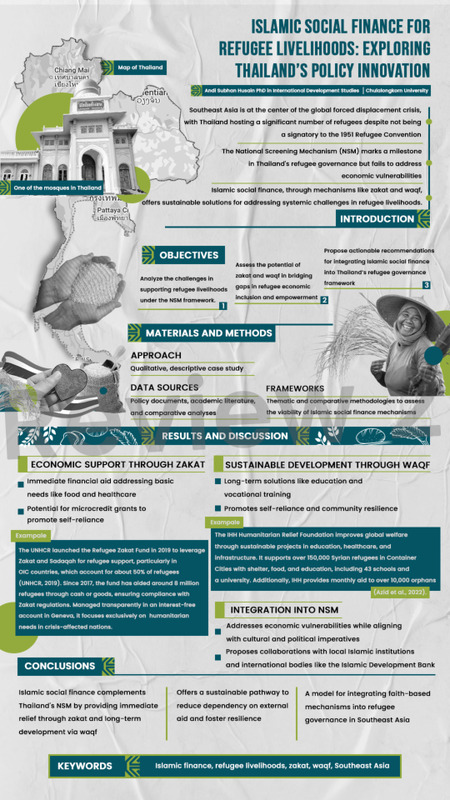Islamic Social Finance for Refugee Livelihoods: Exploring Thailand’s Policy Innovation
Item
-
Tittle
-
Islamic Social Finance for Refugee Livelihoods: Exploring Thailand’s Policy Innovation
-
Conference Acronym
-
IHSATEC 2024: 17th HASIB
-
DOI Number
-
https://doi.org/10.31098/HST24150
-
Conference Date
-
December 19-20, 2024
-
presented at
-
The International Halal Science and Technology Conference 2024 (IHSATEC): 17th Halal Science Industry and Business (HASIB)
-
Poster Author(S)
-
Andi Subhan Husain, Andi Ilham Husain
-
Conference Theme
-
IHSATEC 2024: 17TH HASIB
-
Abstract
-
Abstract
Background – At the end of 2023, 117.3 million urban displaced persons lived globally, with 15.6 million in Asia and the Pacific. In the region, Afghanistan and Myanmar are two of the most important factors that contribute to forced displacement, with Southeast Asia continuing to at the epicenter of this tragedy. Existing framework, such as the Refugee Convention of 1951, frequently fail to meet the needs of refugees, especially in non-signatory countries like Thailand. While the National Screening Mechanism (NSM) represents Thailand’s first attempt to formalize refugee governance, the transformative potential of the NSM is limited by the inertia of the institutions. Islamic social finance, thorough mechanism like zakat (almsgiving) and waqf (endowments), presents an innovative approach to addressing these gaps.
Purpose – This study analyses the potential of Islamic social finance to strengthen Thailand’s NSM to support refugee entrepreneurship and financial inclusion, as well as solving fundamental issues in refugee governance. The research explores the integration of Sharia-compliant financing with humanitarian framework to offer sustainable solutions for refugee protection and livelihoods in Southeast Asia.
Design/methodology/approach – The research uses a secondary data analysis approach, investigating previous research, papers, and policy document aiming to develop an understanding of the potential of Islamic social finance in supporting refugee livelihood in Thailand and beyond.
Findings – Islamic social finance encourages financial inclusion and mitigates economic vulnerabilities, therefore bridging gaps in current refugee governance models, according to preliminary results. These mechanisms develop regional collaboration and contribute to more resilient refugee communities when they are in line with humanitarian and economic empowerment principles (Fassin, 2012; Betts & Collier, 2017).
Research limitations – The analysis mainly focuses on Thailand, with limited comparative focus on the other ASEAN countries. Further research is required to assess the long-term scalability of Islamic finance in supporting refugee governance frameworks.
Originality/value – This study extends the discussion on policy entrepreneurship and refugee governance by explaining how faith-based finance structure can address serious challenges in Southeast Asia. It advocates for Islamic social finance as an essential element for sustainable and inclusive governance of refugees in the region.
Keywords: Islamic finance, refugee governance, zakat, waqf, Southeast Asia
-
Publisher Name
-
Yayasan Sinergi Riset dan Edukasi
-
Publication Date Online
-
19-12-2024


